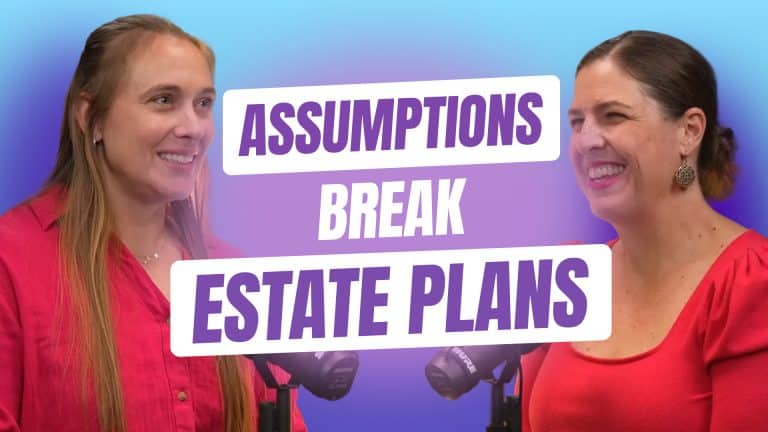Estate planning isn’t just about money—it’s about love. While many people ask “Why bother with estate planning? I’ll be dead anyway,” the real question should be: “Who do I care about, and how can I protect them?”
If you have people you love in your life, estate planning becomes one of the most important gifts you can give them. Here’s everything you need to know about why estate planning matters and how to protect your family’s future.
The Real Cost of Not Having an Estate Plan
Emotional Turmoil for Your Loved Ones
When someone you love passes away, you want your family to focus on grieving and healing—not wrestling with legal paperwork and court proceedings. Without proper estate planning, your loved ones face:
- Lengthy court processes during their time of grief
- Uncertainty about your wishes and intentions
- Stress from navigating complex legal requirements
- Difficult decisions they’re not prepared to make
The Probate Process: What Happens Without a Plan
What is probate? Probate is the court process that allocates your assets and debts to beneficiaries. When you pass away without a will (called dying “intestate”), state statutes determine who inherits your property—regardless of your actual wishes.
The probate timeline in Nevada:
- 1 month to obtain death certificates and gather assets
- 1 month to schedule the initial hearing
- 2 months minimum for creditor claims (for estates under $300,000)
- Additional months for final hearings and distribution
Realistic timeframe: Most probate cases take 8-12 months or longer, not the theoretical 6-month minimum.
Financial Costs of Probate
The financial burden of probate can be substantial:
- Minimum costs: $3,000 for simple cases
- Typical costs: $8,000-$13,000 for average estates
- Nevada home values: With average home prices of $400,000-$500,000, probate costs increase significantly
These costs include:
- Court fees
- Attorney fees (often calculated by statute based on estate value)
- Personal representative fees
- Administrative costs
Why Young Adults Need Estate Planning
Imagine an 18-year-old suddenly inheriting $400,000 from a family home. Even responsible young adults often aren’t prepared to manage large sums of money effectively. Without proper planning, inheritance can lead to:
- Poor financial decisions
- Depletion of assets within a few years
- Loss of government benefits for those with special needs
- Inadequate preparation for long-term financial security
Solution: Trust structures can provide for young beneficiaries’ health, education, maintenance, and support while protecting the principal until they’re mature enough to handle larger distributions.
Common Family Conflicts in Probate
The Caregiver Dilemma
One of the most common probate disputes involves family members who provided care for aging parents. The caregiver sibling often feels entitled to additional compensation, while other siblings may argue the caregiver already received benefits like free housing.
Without clear documentation of your wishes, these family conflicts can:
- Destroy relationships permanently
- Result in expensive litigation
- Delay asset distribution for years
- Create lasting resentment among survivors
Guardianship Issues for Minor Children
If you have young children, estate planning determines who will raise them if both parents pass away. Without a will specifying guardianship preferences:
- Courts decide based on state law, not your wishes
- Family members may fight for custody
- Children could end up with guardians you wouldn’t have chosen
- Important considerations about lifestyle and values may be ignored
Smart Estate Planning Strategies
Beyond Basic Wills: Comprehensive Planning
While wills are important for guardianship designations, they still require probate. Consider these probate-avoidance strategies:
Revocable Living Trusts
- Avoid probate entirely
- Provide detailed instructions for asset management
- Allow for flexible distribution terms
- Maintain privacy (unlike public probate records)
Beneficiary Designations
- Name beneficiaries on retirement accounts
- Update bank account beneficiaries regularly
- Consider transfer-on-death deeds for real estate
Joint Ownership Considerations
- Joint tenancy with rights of survivorship
- Tenants in common (requires probate for deceased owner’s share)
- Community property with rights of survivorship
Critical Property Ownership Mistake
Many Nevada homeowners discover their deed lists ownership as “community property” without additional language. This creates tenants-in-common ownership, meaning:
- Only 50% transfers automatically to the surviving spouse
- The other 50% requires probate
- The surviving spouse cannot sell the home without court approval
- Mortgage payments may become unmanageable
Action item: Review your property deed today. Look for specific language like “joint tenants with rights of survivorship” or “community property with rights of survivorship.”
Key Takeaways for Estate Planning
- Estate planning is about protecting the people you love, not just distributing assets
- Probate is expensive, time-consuming, and emotionally difficult for grieving families
- Young beneficiaries need structured inheritance plans to protect their long-term interests
- Clear documentation prevents family conflicts and expensive litigation
- Property ownership titles matter significantly for avoiding probate
- Regular updates are essential as family circumstances change
Getting Started with Estate Planning
Estate planning doesn’t have to be overwhelming. Start by:
- Reviewing your current property ownership
- Listing your assets and beneficiaries
- Considering your family’s unique needs
- Consulting with an experienced estate planning attorney
- Updating beneficiary designations on accounts
- Discussing your wishes with family members
Remember, estate planning is an ongoing process, not a one-time event. As your family grows and changes, your estate plan should evolve too.
The peace of mind that comes from knowing your family is protected is invaluable. Don’t wait—start your estate planning journey today.




